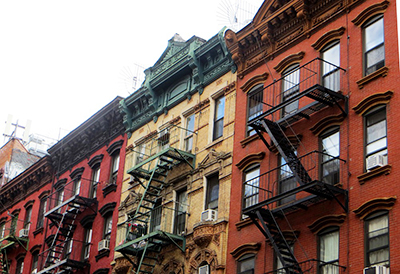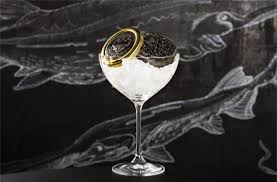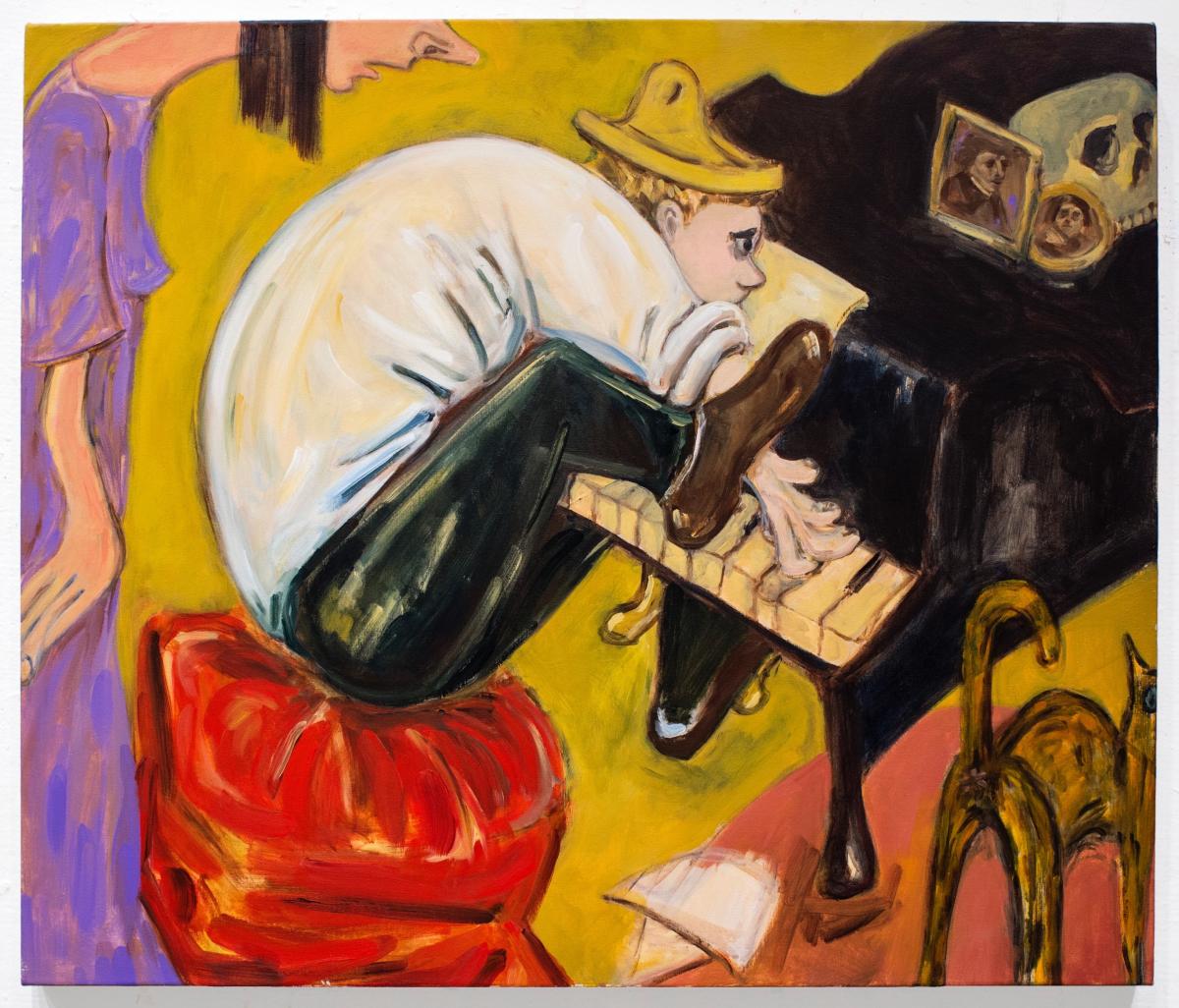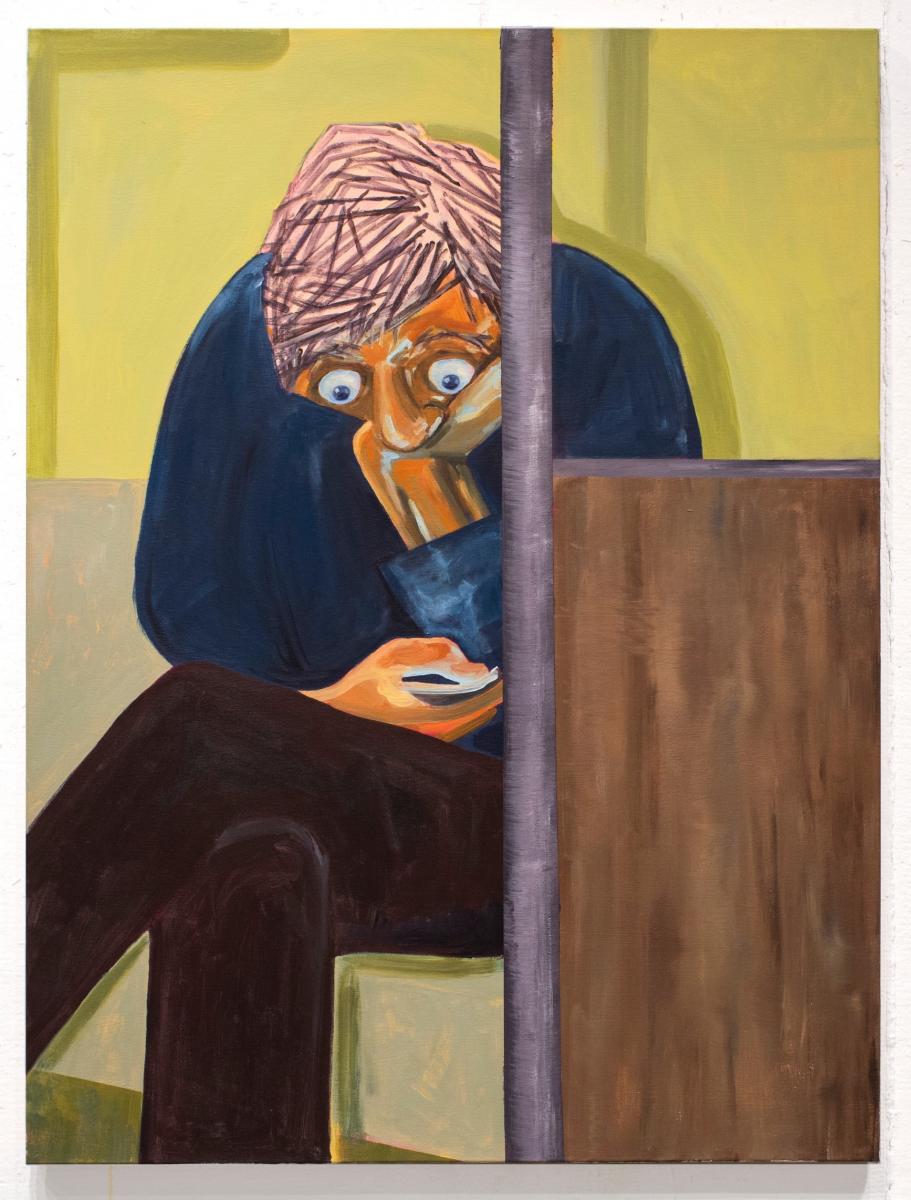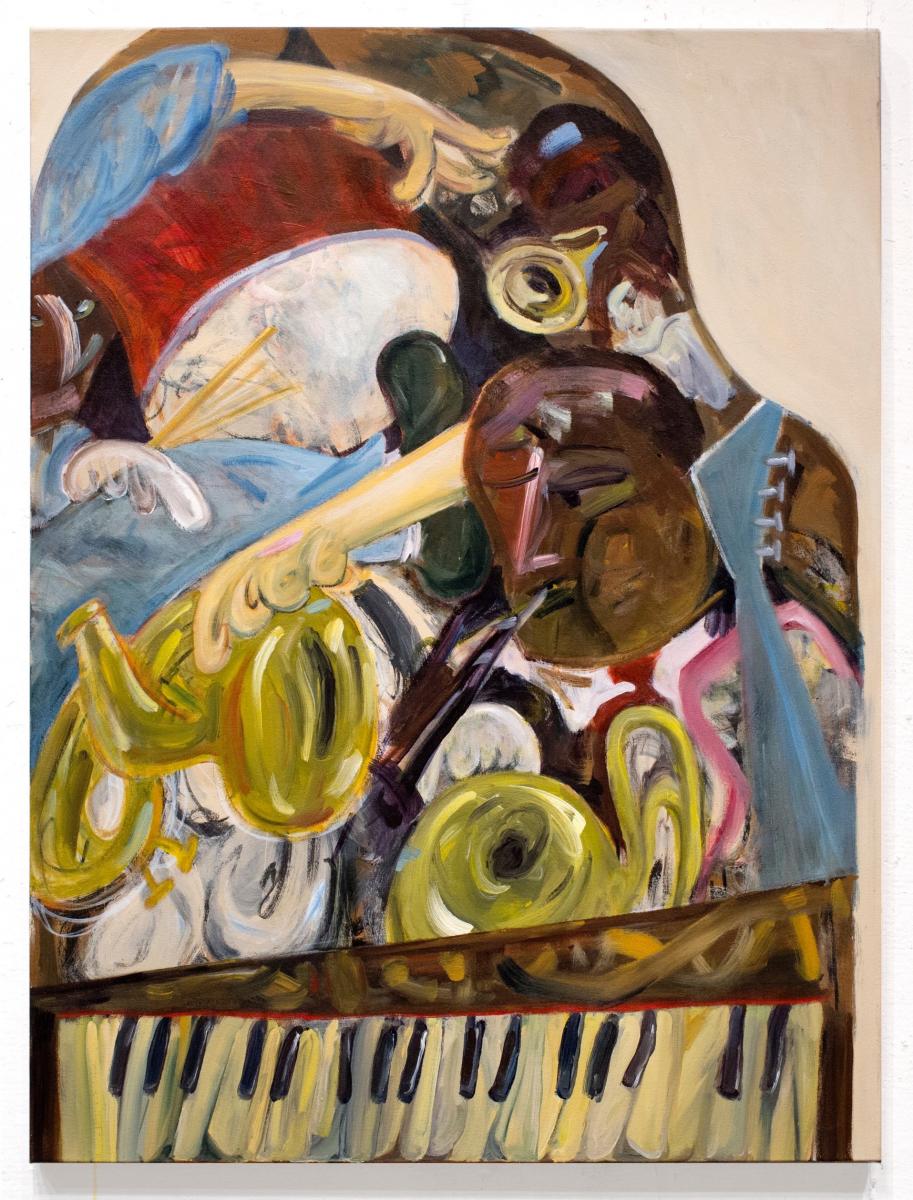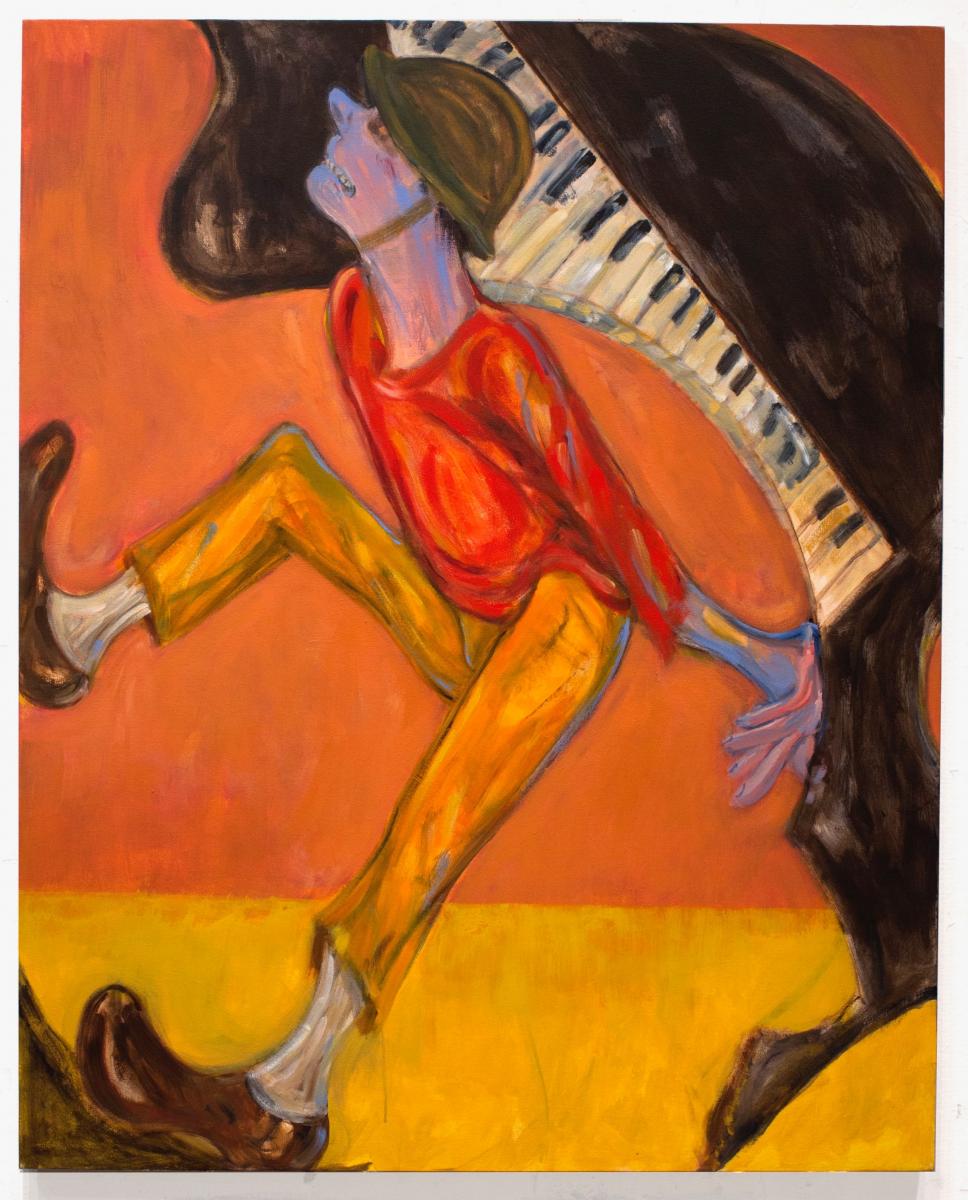Deft, kinky and resolute, Birgül Oğuz’s prose sails into her characters and tenderly splits them open. In “Revol” are displayed the inner worlds of working people, at marginal, insecure jobs in Istanbul, or any Aegean, Mediterranean city, and their wobbly, brilliant heroism. Oğuz’s prose is tactile; consciousness and experience are conveyed in language of the skin. A moment of love in bed before shifts cutting out the guts of fish, “a drop of bloody water” falling from a finger like the chiming of the hour, the honking of a ferry, the grim grind of misogyny and breakthrough of subversion. The terrifying scale of political demonstration and excoriating minutiae of everyday injustice, man-woman, capitalism-nature and… inscrutability.
“Revol” is from Birgül Oğuz’s novel-in-stories Hah, among winners of the 2014 European Prize for Literature. It is being translated into fourteen languages; the English was done by a group of nine working together at the Cunda International Workshop for Translators of Turkish Literature: Alexander Dawe, Mark Wyers, Alev Ersan, Arzu Akbatur, Abigail Bowman, Feyza Howell, Amy Spangler, Kate Ferguson, and Kenneth Dakan.
— Victoria Rowe Holbrook, author of The Unreadable Shores of Love: Turkish Modernity and Mystic Romance, faculty member of the Architecture department of Istanbul Bilgi University, and translator of numerous Turkish works
1.
My lover’s eyes are as clear as a summer night. In the curls of his hair I see caves of light brown. To nestle into them is to be rejoined with my own hollow. Each and every time I’m damp, tired, and tearful. On the nape of my lover’s neck I will gasp for air like a winged fish. How soft you are, he says to me, how moist. His voice ripples in my ears like a blondish bed of reeds. I place my hand in the warmth of his palm and say goodnight. His hair becomes silken rain spilling down onto my back. His lashes grow long enough to envelop us both. Light flows down the street like water, like a flood.
For me, for him, the morning mist is like cotton. Together we walk down to the quay. A blue minibus takes him to Çömlekçi Çukuru. I pass by the tea houses and buses, looking at the cargo ships. The sound of winches dissolves into the water. The ropes slacken, get wet, and are drawn taut again. The morning is so beautiful, like a freshly inked word, and it touches me inside, every morning, my spirit gleams, my eyes burn, ah.
I walk on the shore road, unhurriedly, softly, solitary. I sleep off the remaining half of my slumber all the way to the door of the Fisherman’s Market. When I enter, I change the cottony mist of my tongue into a blue smock. My mind splits at that moment, and one side of me pulls away as the other spills forth. In the palm of my hand the cold knife grows.
The fish have already been placed on the blue-clad wooden counters. How odd, how could so many have died that early in the morning I say, as they gaze blankly into my face. In any case, mourning must be sheer foolishness, the mourning of water, a yeast that will never bloom. I say to myself: What a sentence! ha-ha, what a thing to say so early in the morning, ha! Is there no tea?
The warmth that my lover left in my hands turns to ice as soon as they touch the first fish of the day. I hold the fish by the gills and slice open its belly. With my knife I cut out the organs, which are the purple of aubergine, and scrape them into the bloody basin under the marble counter top. I never let the fish look me in the eye, because at that hour of the morning their gaze is fresh and moist, and their eyes see as if never touched by death. Looking them in the eye slices me open from throat to groin, dripping drop by drop into the bloody organ-filled basin below.
From time to time I, too, rise up in revolt and look up at the clock on the wall, and he looks at me, and as the dead are scaled and gutted, and as the scaled and gutted dead are wrapped up, Meathead, sitting at the register, always stares at me, at my thighs, at my pink wet hands, at my cleavage. The cash register opens with a ring and is shoved closed with a thud, and money dangles from his fat snotty hands as he says: Looking forward to serving you again. Jerk, ‘serve you again,’ slimy jerk, syllables dripping with saliva cling to the sycophant folds of his mouth. My heart churns, my stomach heaves, and a droplet of bloody water always falls from my pinkie finger, plop! into the bag of the dead. And I place the bloody bag into another bag which is as white as a panty pad and adorned with grinning blue dolphins, and I hand it to the customer: Bon appétit.
How time slips past—hours, seasons—between my fingers, cold and slippery, falling from the wet counter top with a plop and the basin fills, only to be emptied by the bucketful, carried off and emptied into the grate, down into nests of rats, piling up, piling up and slipping off their wet backs, churned to foam by the grinding of their teeth and clacking of their jaws, down into dark hollows and then deeper down into that pit where light congeals and thickens, and the darkness is terrifyingly blinding. How it flows; the greasy bulbs swing, plastic bags rustle. I fix my eyes on the wet counter top and think. I think about seeing eyes that know nothing of death. With my own eyes I see the eyes of the dead as they lie there glaring, their gaze fixed on the pit: their gaze is snared like a fish-hook on the soft belly of that hollow. They gaze not toward a distant destination but at the ruins of a time that toppled down long ago. They don’t blink. They have no will to blink. They have no courage. They have no time. There is no time for them, none.
At this point, the fish about to be emptied of their insides are piled up in the basin to my right. The cash register is shoved closed with a thud. Meathead eyes my cleavage wolfishly. I say that he too has eyes, for years he’s had eyes, he has them too. In the split of my mind a long sentence switches tracks, shuffling off the present tense and toppling down into a time that is frozen in place. My knife shrinks, withers and droops. A hand burns in my palm. Bloody water drips from my pinkie finger. I say: Bon appétit.
On the afternoon break, the world smells of damp towels and disinfectant. But the tea is misty and desolate. Unhurriedly, I console myself with two slices of bread and some feta cheese. I eat and think of my lover Memo’s warm, slow hands at the workshop in Çömlekçi Çukuru.
2.
He sits slouched in the light seeping through the greasy window. Aluminium dust rains down onto his hair. With the sound of pounded rivets, drilled aluminium, filed plastic and the whizz and whir of a drill, his insides shudder. The bluesmocked man to his right hands him a circuit board, which he solders and hands to the blue-smocked man to his left. The smoke from the melting solder makes his eyes water. From time to time he looks up from the smoky water, a fish of curiosity with big clear eyes—how quiet and pensive people are, quiet, pensive, dusty, teary-eyed.
Used oil flames in the furnace, leaving the air dry as bone. In the heat of a dry wind their blue smocks shrivel like leaves. The dark dry withered men in smocks never come eye to eye. On occasion they toss glances back over their shoulders. But not at each other; they are looking at the possibility that, at one time, they could have been soldered together. They are looking at the ruins of a sentence that has long been out of currency. Then they become the same man: seen from the outside, a man who’s been dispossessed. Inside, as they hurl the ruins of the past at the present, there is a resuscitated ghost, a feast of unending mourning, a profusion of dust, soil, and seed.
Memo gets up from his chair and walks toward the window. Salman, the simit seller, is going down the street, and there are flocks of children, Bully Cafer, scrap collectors, and Pepe surrounded by clusters of dogs. A part of Memo’s mind is spinning like an empty tin can. In a hundred years, he says—the men wearing blue smocks look up and gaze at his back—Salman the simit seller will be dead. As will the children, scrap collectors, Bully Cafer, Pepe, and the dogs. We too will be dead, along with the bacteria of the yogurt we’ll soon be dipping our bread into and the mulberry tree at the corner of the street and the birds that perch in it. All the hearts that are beating now in the mud of Kurbağalı Creek, in the abysses of the Atlantic, in the crater lakes of Kilimanjaro, in the pistachio orchards of Nizip, in the hollows of the caves of the Yellow Sea and in the eggs laid in those hollows, in incubators, in the coffee houses in Ergani, in an orange grove in Serik, in school toilets, in the register office, in train stations and at the poles of the earth, and what a misery and miracle that they are beating now at the same moment, but uh! they will beat no more. The circuit of the beats and thumps that binds us all together will cease to be. This photograph will yellow in a nasty way.
The light that shines through the greasy window and specks of dust tracing lazy circles in the air freeze in place; the furnace falls silent, the sounds turn cold. That’s when the planet that Memo observes through the window begins to plummet like a piece of fruit falling from a branch, falling down, down, further and further down. Whoa, Memo says, look how it’s falling, hah, it’s not going forward.
He looks back over his shoulder at the men in blue smocks, at the pink paint being added to polyester, at the empty plastic receptacles, at the circuit boards being put into the receptacles, at the circuit boards being lined up on the massive metal tray, twenty-six by twenty-six. They didn’t even come to repossess what’s inside me, he says.
The 676 pink regulators look like jam-filled cookies when the polyester is poured over them. The polyester quivers. It quivers and then congeals. The transistor inside is fossilized like an ancient three-legged insect. Memo can measure the distance between himself and the transistor with a teaspoon. But its clock has stopped, he says, it has stopped, while mine keeps on going. The letters R, T, and L on his smock tremble. My lover can’t measure the distance between himself and the transistor.
3.
Hurry, Papa was saying, hurry.
The bellies of those filthy fascists were bursting with all the blood of the workers and peasants they’d swilled but day had broken and we knew the truth. I gobbled down a piece of bread slathered in jam. With a milk moustache, and joyful that we were going out, I strode into the street, head held high. My hand is a brown egg in Papa’s.
So many birds! May this be a good sign for the month of May. My mouth agape, I pointed at the sky, saying, Papa, look at the birds, Papa ha! and then I skipped forward with grave determination. Minute by minute the crowd swelled. The flag in front of us snapped in the wind, above all ours, a red uproar of cloth fluttering from the ground to the sky; such a flag! Papa was smiling, his eyes sparkling with pride, and he kept turning and winking at me; Look, he said, just look at this crowd of people, look. Even back then I knew that such a gathering of people was akin to victory. Tongues of flame, the churning of water, the howling whirl of wind, that’s what we were and that’s what we said, enough already! Closing my eyes, I was shouting as shrilly as I could: Raise your voice until libelation is ours, it’s your turn in this unstoppable struggle to be free, enough, enough, enough! Papa was all smiles, grinning as he placed his right hand over his heart; raise your left fist, not your right, he said. What a morning, ha! Libelation? Ha-ha! We still hadn’t arrived at the square; you couldn’t count us on your fingers, that’s how many of us there were, it was our day from the beginning, rat-a-tat tat.
Aha! Papa, look at the helly copter! I shouted, bumping into Uncle Metin’s belly, and Memo laughed, holding his belly, jerk that he is.
‘You jerk, what are you laughing at?’
‘How’s it going, little witch?’ Uncle Metin asked me.
Uncle Metin was holding Memo’s hand. Memo was wearing a red shirt and had hung a cardboard sign around his neck which read STOP CHYLD ABUSE. Idiot. Memo was lazy and fat, and when he ran down the hallway his belly shook. His palms were always sweaty, and he sat in the back of the class with Bully Mahmut, whose father was a doorman. Mahmut’s school uniform always smelt like eggs, cheap soap and mildew.
‘There’s never been such a crowd here,’ Uncle Metin said, lighting a cigarette. Papa nodded and said, ‘Isn’t that the truth.’ He also lit a cigarette. Both of them squinted, gazing with pleasure at the crowd.
I bent down and snarled at Memo, ‘That’s not how you write “child”.’ The smile fell from his face. Moron. When the teacher slapped him, Memo’s glasses would go flying. He’d bite his lip, trying not to cry. At lunch he always ate bread smeared with tomato paste. By the end of the day, his snot would get greener and slimier. Snotty jerk.
‘You’re snotty!’
‘No, you are!’
‘You are!’
We’d gone up onto the sidewalk, further away from the bustle. Uncle Metin and Papa were leaning against the wall smoking, and their puffs of smoke blew toward the groups of people. Unable to pull his eyes from the crowd, Uncle Metin said, ‘Probably fifty thousand people here.’ Papa said, ‘Fifty thousand? There must be more like a hundred and fifty thousand.’ Uncle Metin scoffed, and they made a bet for a bottle of rakı.
‘That includes meze.’
‘Bean paste and yogurt with dill.’
‘Dried eggplant in tomato sauce.’
‘And mackelel!’
‘Mackelel?’
‘Mackelel.’
Placards with photos of bedridden, emaciated revolutionaries were carried by. Lots of pillows and blankets. Iron bedsteads. Half-closed eyes. Fingers with knobby joints. Sideways victory signs. They couldn’t be seen in the pictures, but at the edge of those beds were tattered plastic slippers the colour of muddy snow. When the inmates put on those damp slippers and left the room, there was the stench of foul, shit-filled water. Hungry women and men shuffling through putrid water. When they walk, it sounds like the rustling of paper. This is our struggle, they say.
I also shouted: Unstoppable struggle! and made a sideways victory sign, lunging as if I were going to gouge out Memo’s eyes. He leapt back.
‘Put down your hand!’ Papa said.
‘Memo’s afraid of the hunger strike!’
‘I told you to stop doing that!’
‘I’m not afraid of the hunger stripe, you’re the one who’s afraid.’
‘Stop it now!’
‘Si-ssy Me-mooo!’
‘I told you to put down your hand.’
‘Son, it’s not called stripe.’
‘Memo, you’re a sissy!’
‘I’m not a sissy, you are!’
‘Am not!’
I put down my hand, balling it into a fist in my pocket. Helicopters full of filthy fascists buzzed overhead. Uncle Metin gazed after the photos of the faded men and women as they were carried away, and then he turned and whispered something into Papa’s ear. Papa’s fist unclenched and he held out his hand as if he were weighing something disgraceful, and then it dropped like a shot bird and his fingers twined around my own. Come on, he said, we still have a long way to go before we get there.
Uncle Metin’s moustache grew larger and larger, and his eyes and nose retreated inward. One night, Uncle Metin wept at our house, and that night his eyes and nose pulled inward as well. His belly was shaking, and the table shuddered as though an earthquake had struck. Memo was staring at the tomato paste on his plate and hunkered down in his chair. That’s what Memo would do when the teacher slapped him, and then he’d bite his lip. When he didn’t do his homework, he’d say, ‘Teacher, Mahmut tore it up.’ Dirty liar.
We were still so uh! far from the square. Ahead was our flag, we were sweating. Two helicopters full of filthy fascists swooped low, and just then we heard the crackle of a radio and someone in the crowd said, ‘Three dead!’ The bodies of three life-gone revolutionaries were taken away!
When they said that, Papa squeezed my hand hard and then there was a crack. Smoke the colour of egg yolks filled the air. Papa said, ‘There are some dirty agitators among us,’ and he squinted at the swarm of people. ‘Filthy murderers,’ Uncle Metin spat. Memo gulped, the sissy. At that moment, the ties holding the crowd together bang!
snapped ap aaart! Huurry!
Papa shouted and then bang bang bang! Papa tugged me by the hand as we ran for it clippity clop Uncle Metin pointed toward a street up ahead and then from behind we heard Memo cry out
Pa-paa! Pa-paa!
Uncle Metin’s eyes bang! bulged and at that moment, I, as the crowd surged and swirled, I saw Memo clenched up rooted to the spot just over there oy! oy! a prickly pear in the desert oy! a frog with a placard, his throat puffing in and out
ribbit ribbit
where is heeeeee!
Metiiiiin! booooy! Papa shouted, but the stampeding crowd was pushing us further and further clippity clop down the street. Unclemetin oy! had already turned around and was wading through the crowd, splish splash, his belly bouncing as he waded against the rush of people and as he called out
Me-MOOO! Me-MOO!
some windows were broken punches were thrown and w’re gnna kll yu al sid a man wit a gun hs eys ful of bloodred htred n the crwd was wippt into sch a fury that thit tht wht a fury it was a raw yelow smoke flled th air swallwing Memo and Uncle Metin
ffffffffffffffffffffffffffffffffhwp!
my eyes started wuhwuhweeepng yellow tears and Papa said
DON’T be scared!
our flag up ahead we packed into that street pushng n shoving each othr everyone was shving everone else, we wre wuhweeeping yelow tears and we still had so far to go to reach the square and w’re going to kll yu al they wre sying
(but everyone knew where they weren’t going to go. (Because everyone knew that the state was a chariot lowered on strings from high above, lurch by lurch.) Everyone had a soft belly thirsting to bleed (pressing their giant hands to their unravelled stitches, unravel ling wounds (meaning everyone had a soft belly thirsting to bleed)). Everyone had a strangled corpse they paraded around inside them (inside everyone, all of them), everyone had a corpse that marched up from their stomach to their gullet and from there to their mouth. People pinched their lips tight (these were sealed parentheses, they’d closed the circuit long ago). But still the dead had risen as far as the peoples’ mouths; now they were pushing their swollen, knobby fingers between the lips and then, as if sliding up a window (pushing and shoving between tongue teeth palate), opening those mouths. They were opening those mouths and sticking out their scarred, dented heads. As soon as their heads were out, they were propping their elbows on people’s molars (on the molars of the people), resting their chests on the mouths’ ledges (on the ledges of the mouths of the people), and waving to the other dead who’d stuck their heads out of other mouths, saying what’s up? isn’t this a beautiful morning, so, have you gotten used to being a corpse?)
Nothing was happening. But it was terrifying, this nothing. My head grew clouded with dust gas breaking glass and cries and he was squeezing my hand so hard Papaa Papaa!
Whatever happened, this is when it did, another shot sounded, things got ugly at the head of the street. The crowd clenched up like a cramping calf, exhaled, sucked in its stomach and puffed out its cheeks and oof
thump! something went off in my ribcage, the eggshell of my hand crunched, my eyes rolled back into my stomach: It’s okay, Papa was saying still, it’s okayy just don’t be scared it’s okayy! And inside Papa’s mouth was a man watching me from the corner of his eye. He propped his elbows on Papa’s molars and stuck his head out of Papa’s gaping mouth when it opened to say it’s okay and stayed that way, a dark dry dire cute man, a man not afraid of anything any more, staring out at the street, staring without blinking at the dust gas breaking glass and cries. And Papa was saying don’t be scared!, it’s okayy don’t be scared it’s okayy honey it’s okayy don’t be scared it’s okayy just don’t be scared and he was looking at me from the corner of his eye, dark dry dire cute, like all the pain of the world had piled up in my face, like he didn’t have the will, the courage, the time, to blink.
4.
One time, Meathead followed me home. I pretended I didn’t notice, and he pretended he didn’t notice that I was pretending I didn’t notice. I turned right at the underwear store and then left at the local diner, he kept coming after me, jerk, even though I was taking my time, wondering how much longer he’d follow me. I went inside the herbalist, I looked at the dried plums and blueberries, I cracked open an almond, I stalled. Meathead was standing at the produce stall kitty-corner from the herbalist, hands in his pockets, one eye rolling toward me, the other gazing thoughtfully at the potatoes. I felt like laughing but didn’t. I told the herbalist 200 grams of cinnamon sticks, please hurry.
I left the herbalist in a rush, pretending to be fed up and busy. I stopped behind a white van near the meat shop and squinted over at the leeks. I looked and Meathead is scooting toward me, ‘heey,’ he says, ‘heey …’
‘Heey, what’s it to you?’
‘Uhh, uhhguhh …’ His mouth a bit crooked, taking a gulp here and there.
The grocer weighed my leeks and went to hand them over. I was just about to take them when the creep reached out and took my leeks. ‘Give me those,’ I spat, stepping toward him to grab the sack. ‘Hey,’ he said, wagging his finger back and forth, ‘how nice, she thought of her boss.’ And he didn’t give back my leeks.
There was a contention between this moron and me, its roots reaching back into God knows where. This situation was forcing the birth of, not a relationship, but a relation. To be honest, Meathead wasn’t even the last person I’d want a relation with. But this loom was plenty old, its knots had been tied long ago. Which of us was the deer and which was the hunter, who had herded me into this place of ours where so many deer have drunk, where’s the door I should leave from, how could I know where it is.
I went yech! when I first saw him. I’d stopped at the door of the store, pointing at the sign in the window. Meathead was sitting inside. He started checking me out, my thighs, my breasts, my knees. My stomach cramped and all of a sudden my heart leapt into my throat. And right there I clenched up like a stubborn stain. I should have listened to my stomach. I should have cleared out of there as soon as I felt my heart in my throat. But I clenched up. I still don’t know. Why did I walk into that store with my heart in my throat? I ask. It wasn’t like I needed money or anything. I wanted the blue smock, that’s all. A blue smock. That’s all.
Later on, every time I looked at his stupid face and pursed my lips with disgust, I shuddered with the thought of the law that held us together in the same place. Whenever he looked at me he got a look on his face like someone picking their nose, thinking they’re alone. His teeth were disgusting. The fuss of his tomato-pasty hands to and fro during the lunch break, the stupefied look that came over his face as he scratched his belly, the hairy pinkie finger he held in the air as he drank his tea, the spittle accent from who knows where, it was all disgusting. There was nothing strange about loathing him. Who wouldn’t loathe him? The problem was me loathing him. Me, as much as anyone. Because of this, every time I looked at him I saw the scissor marks in my own soul. This creaky soul that despised others with great pleasure, despised and groaned, growing larger as it groaned, no longer fitting in its membrane, its shell, this was my soul. I didn’t have a lick of patience for day-to-day language. But on the other hand, I was a day labourer to the hilt of my knife. And if I started not to loathe Meathead for even a second, we would wither the world.
‘Wanna sit down and get a tea over there, huh?’ Meathead was saying. They opened the back door of the white van and started to haul the cow and sheep heads out of it into the meat shop. I’d never seen cow and sheep heads uncooked before, not decapitated like this.
‘Let’s get a tea in that little corner, come on, nice n’ hot, huh?’
I’d seen them cooked plenty of times, inside ovens lit up with greasy bulbs to whet the appetites of those walking by, brown grease drips off their noses and they look just like smiling, eyeless goats.
‘Dontcha think there’s a spark between us, come on, let’s talk you and me, drink a tea, glug glug, nice n’ hot?’
Their eyes were moist and bright, just recently deadened, clearly in a terrible way, their bodies still trembling and clenching up, dangling on iron hooks from the ceiling of a slaughterhouse far away but there are no eyes there, the eyes are here, they’re looking around, what is this place where’s my body what is this place where’s my body.
‘At least let’s move to the side a little, baby, don’t wanna get in the way of these guys,’ said Meathead. I felt like laughing again, but I think I was slowly but surely losing my mind.
‘Look,’ I said, ‘I won’t move an inch and I won’t drink tea with you and I’m not your baby and give me back my leeks.’
‘Why’s that?’ he asked, laughing as he asked, stomach jiggling as he laughed, leaning back a bit as his stomach jiggled, the sack swinging as he leant back.
‘Because,
I said and a deadened cow passed between us, resting its cheek on a bloody smock and crying
‘those leeks are mine,’
the bloody-smocked man came out of the meat shop swinging his arms, passed between us huffing and puffing, and got into the white van
‘Besides,
I said and a deadened ram passed between us, resting its forehead on the bloody smock and crying
‘are you my soulmate or something that I have to drink tea with you, give me back my leeks.’
‘Look at youu,’ said Meathead, and his mouth twitched. ‘A sharp little tongue, but I love me a sharp tongue, I wanna love that sharp tongue of yours.’ And shik! he was clicking his tongue, shaking his eyes to and fro shik dada shik dada shik shik.
It felt like the inner wall of my stomach had burst with rabid foam.
‘Listen,’ I said, ‘are you giving back my leeks or not?’
‘And what if I don’t?’ he said with a click of his tongue, the little shit.
‘What’s going to happen if you don’t?’
‘Uh huhh … what’ll happen?’
‘You’re asking what will happen if you don’t, is that right?’
‘Uh huhh … what’s gonna happen?’
‘What am I gonna do?’
‘What are you gonna do?’
‘Take one guess what I’m gonna do.’
‘What are you gonna do then?’
‘Oh, I’ll do something …’
‘That’s great baby but what, what’s gonna happen?’
‘Something, something’s gonna happen.’
Meathead was laughing and shik! clicking his tongue, shaking his eyes shik dada shik shik dada shik.
Now I was pumped up and pissed off. Meathead’s teeth were wet and growing larger. The door of the white van was shrinking, shrank as small as an anchovy’s mouth. The market’s lights blurred together. Fruit, vegetables, and the white van all dissolved pssst bit by bit in that tangled light. I could have killed him off. In a flash, in the blink of an eye. I could have killed him off, everyone knows. But me, I’d wanted the blue smock. That’s all. A blue smock. Hah!
‘Eey, what is it, let’s see?’
‘Shake it baby …’
‘What?’
‘Shake it baby. Shake.’
‘Uh, shake what?’
I raised my arms out to the sides, clicking my fingers shik dada shik dada, and gave a shake of my hips, left right snap.
‘Now click your fingers like this! Watch! Oh oh! Snap ’em!’
‘What the hell are you doing …’
‘Pull up that smock and rock my world! Oh oh! It hurts, it hurts!’
‘Would you shut up.’
‘Pat-a-cake pat-a-cake baker’s man, shake me a cake as fast as you can, snap it and shake it and mark it with a B …’
‘Cut it the hell out.’
‘Pull up that smock! Grab it! Grab it, man! Enough! Gimme whatcha got!’
‘Here, take the leeks.’
‘Snap baby shake and snap!’
‘Take your leeks, you psycho.’
‘Swiing! Theem! Hiips!’
‘Take your damn leeks!’
I took them and screamed shithead! in his face. Without flinching, I jabbed my finger into his heart. It was empty, it really was, but that’s not quite all of it.
5.
I can’t even call it a room, but inside a fire’s burning. I just want to hug my knees to my chest and shrivel up in a corner, but no, I say, not like that. And who put that fire there.
A cool air hits my face when I come out into the hallway, but it’s humid. The walls are mossy, streaked, wet. They quiver when touched, like meat. Who the hell would make a wall like this.
I feel like rising up into the open air. I look, a window’s ajar. Forget the door, I say, the window’s best. Then when I’m in front of the window I realize the door is better. But it’s too late. They had set the table long ago. Potato stew, rice and pickles. Come on, Papa says, hurry it up.
I don’t want potato stew. I don’t want rice. I don’t want pickles. Papa hands me the salt. No, I say, not that either. I feel depressed. The table sways.
Ah, I say, Unclemetin’s here. He’s crying so hard, weeping and weeping. Memo’s tossing nuts at my plate. Don’t cry, Papa says to Unclemetin, you have to forgive yourself. Your papa is a little traitor, I say to Memo.
And then I bang on the table tak takka tak with the handle of my spoon. Everyone goes quiet. That’s enough, I say, let’s cheer up a bit, come on, hands in the air! We all start together singing ka-kalinnnka maya! Papa’s clapping his hands, Unclemetin hits his fork on his glass. Memo sways his head back and forth. But they can’t keep the beat at all. No, I say, not like that. No. Not like that.
The door opens, two sweaty men in ski masks come inside. Black shafts dangle from their waists. Is it the Sivas crew? Yes we’re the Sivas crew, they say, come on, hands in the air! Together we all start dancing Logs Burn on the Banks heavy eyes awake / double wicks, one wound / can the heart endure.
Suddenly my insides twist up really bad, I’m not going to dance, I say, shrugging my shoulders. You’ll dance, they say. No no, I say, you don’t get it, I’m not going to dance. You’ll dance, they say. Come on Memo let’s go, I say. Come on, my Memo, my love. We aren’t going to dance, in fact. But that’s not quite all of it.
Then you’ll go to sleep, they say in unison. Then they grab their black shafts.
Memoo! I say, don’t go to sleep! Hurry, let’s get out of here, it’s nuts.
Papaa! Don’t go to sleep. This place is nuts! Nutsss!
But you’re the salt of the earth, don’t forget, says Papa, there is yet another revolution. He squeezes something really—really really—heavy into my hand. Then he skips off down the hallway. What the hell! Who would’ve thought, a papa skipping and running down a hallway?
I say Papaa Papaa! It’s nuts here!
It’s okay honey don’t be scared! It’s okayy! It’s okayy!
Papaa! Papaa! It’s so heavy Papaa!
It isn’t, honey, it isn’t! It’s empty, just empty!
It isn’t Papa it isn’t!
It isn’t!
It isn’t!
6.
‘Don’t tell me,’ said Memo, ‘tell the water, not me.’
His voice rippled in my ears like a blondish bed of reeds. A misty, glacial-blue light was dripping in from the window.
‘It’s five o’clock,’ said Memo.
Under the blanket it was dark and warm. I nestled up to Memo. Yeah, I said, I won’t tell you. I won’t tell the water either. I’ll start over again, once more, from the very beginning. I’ll start again from the beginning.
I was letting myself slip into another dream, like a paper boat into water, and woke again to my own voice:
‘I can’t do it Memo, I’ll sink Memo, it’s so heavy Memo.’
‘You’ll do it,’ said Memo, ‘fear no more, forget, a handful of dust for you.’
It’s not just a handful of dust for me, Memo. Sissy Memo.
‘You’re the sissy.’
‘You are.’
‘You are.’
Reprinted with permission of the author.
